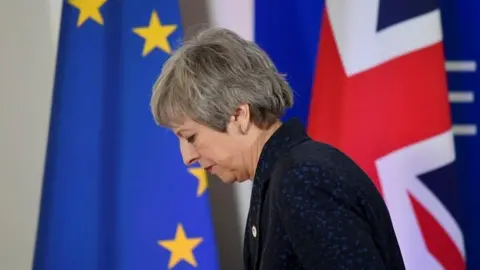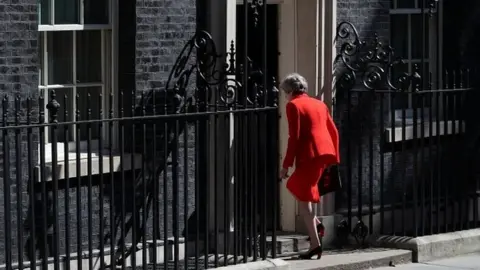Laura Kuenssberg: May was just overwhelmed by the job

 Reuters
ReutersShe was just overwhelmed. Overwhelmed by the divisions in her own party, that she simply did not have the political ability to patch up.
At the start she boasted about not being a creature of Westminster's bars and cliques. But it meant this very private politician had few true friends to help when things turned sour, and neither the powers of patronage, nor the capability to schmooze or arm twist to get people around to her point of view.
Few of her cabinet colleagues, even now, know her well at all, one saying that "as things got harder the circle got smaller". Another revealed that "there was no trust, and no faith".
Settling the Tories' decades-long dispute over Europe was always perhaps beyond just one leader. But the wounds have got more painful under her leadership, rather than fading away.
Mrs May was overwhelmed too by the contradictions of the Brexit policy she set. A reluctant Remainer at the start, she wanted to prove to her party that she really wanted us out.
So she set red lines that strangled the possibility of a straightforward deal. This led to an uneasy compromise that would struggle to thrill anyone, after the country had made a binary choice in the referendum. And, as for her plan, she herself, let alone the cabinet, never had much appetite to sell it.
As Mrs May stood in Downing Street to announce she was going, she urged compromise. But her political opponents are already remarking that it was a plea she only heeded far, far too late.
This has been a broken administration for a long time. The idea that in a matter of weeks a genuine compromise could be reached with the other parties - after nearly three years of trying to stick to a Tory strategy - was always far-fetched.
It's also worth noting how quickly her cabinet colleagues turned when her compromises would have meant having to vote for legislation that might have enabled another referendum - votes that would have been a drag on their chances in the leadership race.
 Reuters
ReutersMrs May was also, of course, overwhelmed by Parliament. I'll always remember the morning after the general election in 2017, when a senior Tory said: "From now, me and only six mates will be able to stop anything happening."
How prescient that proved to be. The Commons has indeed become a place where small groups pursuing the purity of their policy have overpowered attempts at pragmatism.
Mrs May's departure marks the end of an episode of collective Westminster failure too. There is nothing right now that suggests the next leader will turn that into success.
No one could ever accuse the departing prime minister of not caring enough.
Contrast her agony at the end of her lectern statement with David Cameron's shockingly casual whistle as he went back into Number 10.
Even in this moment of huge drama Mrs May wanted to make a point about changes she has been able to make: action on domestic violence, trying to tackle racial discrimination, attempts to deal with lack of housing.
But she must know that the chapter in our history bearing her name will be about Brexit, and her failure to achieve it.
There was always perhaps a mismatch between the scale of the challenges and her political ability: overwhelming in the end for Theresa May, with the public and her party underwhelmed by her.

More on May

